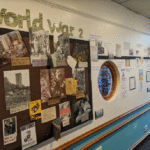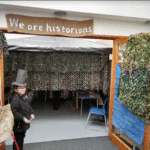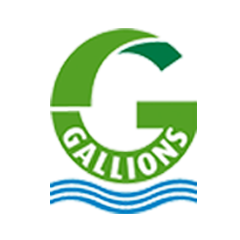At Gallions, our history curriculum aims to give every child the opportunity to feel like an expert within the subject. We believe that children learn best when they are engaged and see a true purpose to their learning. Using the National Curriculum as a guide, children cover a range of important British, world and local history topics through a whole-school, a term-long project titled: We Are Historians. Throughout their time at Gallions, children are expected to build and develop core historical skills through the concepts of: historical enquiry and evidence, interpreting the past, understanding chronology and communicating historically.
 |
 |
In order to make history projects engaging and purposeful, we follow an adaptation of the project-based learning method, whereby children are hooked into learning with real-life tasks organised around weekly questions. The tasks aim to be pupil-led and teacher-facilitated where they culminate in meaningful finales. The finales are designed to be purposeful, with a real-world outcome which helps drive learning across the term and allows opportunities for year groups to revisit core knowledge categories and previously learnt skills. Examples of projects include, Year 3 hosting their own Stone Age art galleries to Year 5 writing, directing and producing their own WW2 documentaries for local elderly residents. Through our version of project-based learning, we aim to meet both the national curriculum requirements and also the unique needs of our diverse students.
To find out more about History finales please visit this page. Or watch some of our Year 2 Little People Big Dreams speeches.
http://https://youtu.be/l90QrDf5iA4
Project learning for history is enriched with opportunities that aim to boost curiosity and cultural capital. Throughout projects, learning is enriched with visits to museums and workshops; access to high-quality artefacts and texts; and opportunities to discover more about their own local and cultural histories. Students help build schema by revisiting core knowledge concepts. By the end of Year 6, students will gain a greater understanding and see relationships between historical change, legacy, empire and power. We appreciate the importance of all teachers having strong subject knowledge and aim to drive this with regular learning conversations. These learning conversations aid with assessment and help us adapt to specific needs of different cohorts, whilst also ensuring that historical coverage, skills and knowledge are sufficiently covered.
Key Historical Concepts Progression
During a Gallions’ child’s history learning journey, we want children to start linking together their learning in meaningful ways. We aim to do this by highlighting key concepts and themes that children can centre and build their learning. The table below shows where the concepts of change, legacy, power, and empire are introduced and a more detailed progression map can be viewed here.
These core concepts are not one-off learning points, instead they are built upon through their history learning.
| Year group | Key Concept | Description |
| Early Years | Change | This concept provides an early appreciation of change and a foundation understanding that history is about the changes that happen over time. Children will be introduced to changes over living memory. |
| Year 1 | Change | In Year 1, children build on their understanding of change and that history is not just limited to their personal experiences. They will start to explore changes in older family and community members’ memories and the changes that take place in physical objects (artefacts). They will start to appreciate that these changes can be presented through an introduction to chronology through simple timelines. |
| Year 2 | Legacy | In this concept, children will learn the concept of legacy. Through their studies of inspirational people children will start to appreciate the legacy that people can make. |
| Year 3 | Legacy and Change | At the start of LKS2, children consolidate and build upon their previously learnt concepts. They learn of the legacy of people throughout the Stone Age, Bronze Age and Iron Age as well as an understanding of why things changed. |
| Year 4 | Power | Year 4 will start to investigate the concept of power. They look at how power can cause changes to where people live and how people live. |
| Year 5 | Power and Empire | As well as building on their knowledge of power through wars, Year 5 are introduced to the concept of Empire. They will investigate the role of the British Empire during war, the empires of the allies and axis powers. |
| Year 6 | Power, Empire, Legacy and Change | Year 6 aims to consolidate their understanding of power, empire, legacy and change through their studies of two ancient civilisations: Ancient Egypt and the Kingdom of Benin. |
Enrichment, Cultural Capital and Purpose
Throughout projects, learning is enriched with visits to museums and workshops; access to high-quality artefacts and texts; and opportunities to discover more about their own local and cultural histories. Each enrichment activity has a linked question which helps frame learning and a clear purpose which helps reinforce core concepts.
| Year Group | Enrichment Activities | Question | Purpose |
| Early Years | Invite in different experts (e.g. animal handlers, magicians etc.) | What does an expert do? | This experience provides children with foundation knowledge of what an expert is. They will come back to the concept of being an expert in a field through their history learning journey at Gallions. |
| Year 1 | Visits from parents and local people | What has changed? | This enrichment activity provides children with an appreciation of London in the past as well as a chance to explore and celebrate personal and cultural differences. It also reinforces the concept of change. |
| Year 2 | Visits from actors playing historical figures. | What can we learn from stories? | Children learn about the legacy of influential people from historical visitors. The activity also provides a chance to improve oracy for their speeches. |
| Year 3 | Badger Bushcraft & West Ham Park. | How did prehistoric people live? | Provides children an understanding of archaeological skills; opportunities to ask an expert question and a hands-on experience which cannot be completed in school. The visit also draws further understanding of change and legacy. |
| Year 4 | Museum of London – Roman, Viking and Saxon artefacts. | What does a good museum look like? | As well as seeing artefacts from their three invaders, the museum trip acts as a baseline for what a world class museum looks like – essential for when children start creating their own museum. |
| Year 5 | Imperial War Museum | Which invader was most powerful? | As well as a chance to see a variety of WW2 artefacts, this enrichment opportunity also allows children to pose questions to an evacuee – finding out more about the impact of the war in London. The experience also allows children to start thinking about the role of the British Empire during the war. |
| Year 6 | British Museum | What were the experiences of those living during the war in London? | Children will ask questions about power, empire and belonging. Not only is this a chance to see real artefacts about the subjects they are studying, it also provides an opportunity for historical interpretations. |
We are Time Travellers Project Finale Sites (2020) – Examples of previous years finale work
Nursery | Reception | Year 1 | Year 2 | Year 3 | Year 4 | Year 5 | Year 6
